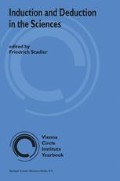Abstract
Laws are true lawlike sentences. But what is lawlikeness? Much effort went into investigating the issue, but the richer the concert of opinions became, the more apparent their deficiencies became too, and with it the profound importance of the issue for epistemology and philosophy of science.
Access this chapter
Tax calculation will be finalised at checkout
Purchases are for personal use only
Preview
Unable to display preview. Download preview PDF.
References
Carnap, Rudolf / Richard C. Jeffrey (Eds.), Studies in Inductive Logic and Probability, Vol. I, Berkeley: University of California Press 1971.
Cartwright, Nancy, Nature’s Capacities and Their Measurement, Oxford: Clarendon Press 1989.
de Finetti, Bruno, ”La Prevision: Ses Lois Logiques, Ses Sources Subjectives”, Annales de l’Institut Henri Poincaré 7, 1937. Engl. translation “Foresight: Its Logical Laws, Its Subjective Sources, in: Henry E. Kyburg jr. / Howard E. Smokler (Eds.), Studies in Subjective Probability, New York: John Wiley & Sons 1964, pp. 93–158.
Gärdenfors, Peter, “An Epistemic Approach to Conditionals”, American Philosophical Quarterly 18, 1981, pp. 203–211.
Giärdenfors, Peter, Knowledge in Flux, Cambridge, Mass.: MIT Press 1988.
Halpern, Joseph Y., “Conditional Plausibility Measures and Bayesian Networks”, Journal of Al Research 14, 2001, pp. 359–389.
Hild, Matthias, Introduction to Induction. On the First Principles of Reasoning, to appear. Jeffrey, Richard C. (Ed.), Studies in Inductive Logic and Probability, Vol. II, Berkeley: University of California Press 1980.
Joyce, James M., The Foundations of Causal Decision Theory, Cambridge: Cambridge University Press 1999.
Köhler, Eckehart, “Physical Intuition as Inductive Support. Comments on Wolfgang Spohn’s ‘Laws are Persistent Inductive Schemes”’, this volume 2003, pp. 151–167.
Lange, Marc, Natural Laws in Scientific Practice, Oxford: Oxford University Press 2000.
Lewis, David K., Counterfactuals, Oxford: Blackwell 1973.
Nayak, Abhaya C., “Iterated Belief Change Based on Epistemic Entrenchment”, Erkenntnis 41, 1994, pp. 353–390.
Niiniluoto, Ilkka, “Inductive Systematization: Definition and a Critical Survey”, Synthese 25, 1972, pp. 25–81.
Otte, Richard, “A Critique of Suppes’ Theory of Probabilistic Causality”, Synthese 48, 1981, pp. 167–189.
Pearl, Judea, Causality. Models, Reasoning, and Inference, Cambridge: Cambridge University Press 2000.
Popper, Karl R., Logik der Forschung, Wien: Springer 1934.
Ramsey, Frank P., “General Propositions and Causality”, 1929, in: Frank P. Ramsey, Foundations. Essays in Philosophy, Logic, Mathematics and Economics, ed. by David H. Mellor, London: Routledce & Kegan Paul 1978. pp. 133–151.
Sahlin, Nils-Eric, “Obtained by a Reliable Process and Always Leading to Success”, Theoria 57, 1991, pp. 132–149.
Sahlin, Nils-Eric, “‘He Is No Good For My Work’. On the Philosophical Relations Between Ramsey and Wittgenstein”, Poznan Studies in the Philosophy of Science and the Humanities 51, 1997, pp. 61–84.
Skyrms, Brian, Causal Necessity, New Haven: Yale University Press 1980.
Spohn, Wolfgang, Eine Theorie der Kausalität, unpublished Habilitationsschrift, München 1983.
Spohn, Wolfgang, “The Representation of Popper Measures”, Topoi 5, 1986, pp. 69–74.
Spohn, Wolfgang, “Ordinal Conditional Functions. A Dynamic Theory of Epistemic States”, in: William L. Harper / Brian Skyrms (Eds.), Causation in Decision, Belief Change, and Statistics, vol. II, Dordrecht: Kluwer 1988, pp. 105–134.
Spohn, Wolfgang, “A Reason for Explanation: Explanations Provide Stable Reasons”, in: Wolfgang Spohn / Bas C. van Fraassen / Brian Skyrms (Eds.), Existence and Explanation, Dordrecht: Kluwer 1991, pp. 165–196.
Spohn, Wolfgang, “Causal Laws are Objectifications of Inductive Schemes”, in: Jacques-Paul Dubucs (Ed.), Philosophy of Probability, Dordrecht: Kluwer 1993, pp. 223–252.
Spohn, Wolfgang, “ Begründungen a priori — oder: ein frischer Blick auf Dispositionsprädikate”, in Wolfgang Lenzen (Ed.), Das weite Spektrum der Analytischen Philosophic. Festschrift für Franz von Kutschera, Berlin: de Gruyter 1997, pp. 323–345.
Spohn, Wolfgang, “Wo stehen wir heute mit dem Problem der Induktion?”, in: Rainer Enskat (Ed.), Erfahrung und Urteilskraft, Würzburg: Konigshausen & Naumann 2000a, pp. 151–164.
Spohn, Wolfgang, “Deterministic Causation”, in: Wolfgang Spohn / Marion Ledwig / Michael Esfeld (Eds.), Current Issues in Causation, Paderborn: Mentis 2000b, pp. 21–46.
Spohn, Wolfgang, “Vier Begründungsbegriffe”, in: Thomas Grundmann (Ed.), Erkenntnistheorie. Positionen zwischen Tradition und Gegenwart, Paderborn: Mentis 2001, pp. 33–52.
Spohn, Wolfgang, “Laws, Ceteris Paribus Conditions, and the Dynamics of Belief’, Erkenntnis 57, 2002, pp. 373–394.
Author information
Authors and Affiliations
Editor information
Editors and Affiliations
Rights and permissions
Copyright information
© 2004 The Author(s)
About this chapter
Cite this chapter
Spohn, W. (2004). Laws Are Persistent Inductive Schemes. In: Stadler, F. (eds) Induction and Deduction in the Sciences. Vienna Circle Institute Yearbook, vol 11. Springer, Dordrecht. https://doi.org/10.1007/978-1-4020-2196-1_9
Download citation
DOI: https://doi.org/10.1007/978-1-4020-2196-1_9
Published:
Publisher Name: Springer, Dordrecht
Print ISBN: 978-90-481-6555-1
Online ISBN: 978-1-4020-2196-1
eBook Packages: Springer Book Archive

